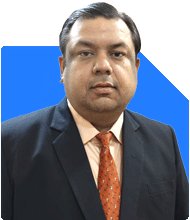44-Year-Old Professional With 75 Lakh Home Loan - Repay or Invest?
Ramalingam Kalirajan |7948 Answers |Ask -Follow
Mutual Funds, Financial Planning Expert - Answered on Oct 09, 2024
He has an MBA in finance from the University of Madras and is a certified financial planner.
He is the director and chief financial planner at Holistic Investment, a Chennai-based firm that offers financial planning and wealth management advice.... more

I have availed home of 75 lakh. Loan account have over draft facility so I have parked all my savings of 65L in over draft. Plus point I am paying no nterest and amount is accessible in case needed. Please advise shall I start repaying in bulk 5L per year or invest in mf/equities. I am 44 yo working professional , 30L pa salary and looking to create corpus for retirement in next 10years
Let’s break this down into several key aspects for you to consider.
Overdraft Facility: A Double-Edged Sword
The overdraft (OD) facility is a smart choice in your current scenario. It provides liquidity, meaning you can use the funds anytime, while also saving on interest payments since your Rs. 65 lakh reduces the loan balance. This system gives you flexibility and ensures your funds are working for you by reducing the loan interest.
However, keeping all Rs. 65 lakh parked in the OD may not be the most efficient long-term strategy. This is because the opportunity cost of not investing these funds in potentially higher-return instruments like mutual funds or equities could outweigh the interest savings from the home loan.
Advantages of Keeping Money in the OD Facility:
Interest saved is almost equal to the loan’s interest rate (around 7-9%).
Full liquidity to use your money if any emergency arises.
Disadvantages:
No growth on the Rs. 65 lakh if it stays in the OD account, as the money is not invested in wealth-creating assets.
Should You Repay the Home Loan or Invest in Mutual Funds/Equities?
The next question is whether to repay the loan in bulk or start investing. Since you have already significantly reduced the loan interest by parking Rs. 65 lakh, let’s look at the factors that will help you decide:
Interest Rate Comparison: The home loan interest rate is typically around 7-9%. Historically, mutual funds have delivered returns in the range of 10-12% (depending on market conditions and fund types). Hence, investing in mutual funds could give you higher returns than the savings on your home loan interest.
Your Investment Horizon: You have a 10-year investment horizon before you plan to retire. This is an adequate time frame to take advantage of equity market growth. Equities and equity mutual funds tend to outperform debt instruments and loan interest rates in the long run.
Risk Appetite: Equity investments come with a certain level of risk. If you are comfortable with volatility in the short term and want to maximize returns over the next 10 years, mutual funds and equities are a good option. However, if you are more conservative, consider a balanced approach between debt and equity.
Emergency Needs: If you foresee any major financial requirements in the near future, it might be wise to keep part of your funds in the overdraft facility for liquidity. Otherwise, you can allocate a portion of these funds towards investments.
Investment Strategy for Your Corpus Goal
To meet your retirement goal of creating a large corpus, let’s assume you want a combination of regular income and growth.
SIP in Equity Mutual Funds: Systematic Investment Plans (SIPs) in equity mutual funds can help you build wealth consistently over time. If you haven't already, consider investing Rs. 25,000 to Rs. 30,000 monthly in diversified equity mutual funds, small-cap funds, or mid-cap funds based on your risk appetite.
Diversified Equity Portfolio: Having a mix of large-cap, mid-cap, and small-cap funds will give you a balanced exposure to the market, ensuring both stability and growth.
Debt Allocation for Stability: As you move closer to retirement, you should allocate a portion of your portfolio to debt funds. These are safer and provide more stability compared to equities. Starting with around 20-30% debt allocation now and increasing it as you approach retirement will help balance the risk.
Equity Portfolio for Long-Term Growth: Continue to invest in equity mutual funds, as they offer potential higher returns over the long term. Given your 10-year horizon, you can afford to ride out market volatility and benefit from the growth.
Reviewing Current Mutual Funds:
If you're already invested in mutual funds, assess their performance. Replace underperforming funds with more consistent ones. Avoid index funds, as they often underperform actively managed funds in India. Active funds, managed by skilled fund managers, can generate higher returns by picking the right stocks.
Avoid direct funds, as investing through a Certified Financial Planner (CFP) can ensure better fund selection and management.
Creating a Corpus for Your Children’s Education and Marriage
Your daughter is 9 years old, and your son is 4. You’ll need a substantial corpus for their higher education and marriage.
Start Separate SIPs: Consider starting separate SIPs for each child’s education goal. Since you have about 7-9 years for your daughter’s education expenses and about 12-14 years for your son, SIPs in a mix of equity and debt funds can help build the required corpus.
Sukanya Samriddhi Scheme: You’ve already invested Rs. 4 lakh in the Sukanya Samriddhi Yojana for your daughter. This is a great initiative, but you’ll need to supplement this with equity-based investments to meet the rising education costs.
Gold for Marriage: If you're inclined towards traditional methods, you can consider buying small amounts of gold (as part of your overall investment strategy) for their marriages. However, avoid allocating a large portion of your wealth to gold, as its growth potential is limited compared to equities.
Optimizing Tax Benefits
While planning your investment and loan repayment strategy, consider the tax benefits you are already availing from your home loan under Section 80C and Section 24(b) of the Income Tax Act.
Maximize 80C Investments: Ensure that your investments in EPF, PPF, Sukanya Samriddhi Yojana, and life insurance policies help you claim the maximum tax benefit of Rs. 1.5 lakh under Section 80C.
Section 24(b): Interest paid on your home loan is eligible for a deduction of up to Rs. 2 lakh. As you're not paying much interest due to the overdraft facility, the benefit here might be minimal. However, investing the funds instead of repaying the loan could provide better tax efficiency in the long run.
Final Insights on the Path Forward
You have set up a solid base by utilizing the overdraft facility effectively, which is commendable. However, with a 10-year window before retirement, it’s crucial to focus on wealth creation through strategic investments.
Keep a portion of your funds in the overdraft for liquidity and emergencies. However, gradually reduce the excess parked amount and allocate these funds towards mutual funds and equities for better long-term returns.
Continue with your SIPs, and review your mutual fund portfolio regularly. Replace underperforming funds with more consistent performers, but avoid index funds and direct funds. Consult a Certified Financial Planner (CFP) for tailored advice and regular portfolio reviews.
Build separate investment plans for your children’s education and marriage. Ensure a mix of equity and debt to balance growth with safety.
Lastly, revisit your financial plan periodically to ensure you remain on track to achieving your retirement and other financial goals.
Best Regards,
K. Ramalingam, MBA, CFP,
Chief Financial Planner,
www.holisticinvestment.in
https://www.youtube.com/@HolisticInvestment
You may like to see similar questions and answers below
Ramalingam Kalirajan |7948 Answers |Ask -Follow
Mutual Funds, Financial Planning Expert - Answered on May 07, 2024
Ramalingam Kalirajan |7948 Answers |Ask -Follow
Mutual Funds, Financial Planning Expert - Answered on May 21, 2024
Ramalingam Kalirajan |7948 Answers |Ask -Follow
Mutual Funds, Financial Planning Expert - Answered on Jul 25, 2024
Mayank Chandel |2002 Answers |Ask -Follow
IIT-JEE, NEET-UG, SAT, CLAT, CA, CS Exam Expert - Answered on Feb 12, 2025
Yogendra Arora |5 Answers |Ask -Follow
Tax Expert - Answered on Feb 12, 2025
Dr Dipankar Dutta |757 Answers |Ask -Follow
Tech Careers and Skill Development Expert - Answered on Feb 12, 2025
Yogendra Arora |5 Answers |Ask -Follow
Tax Expert - Answered on Feb 12, 2025
Yogendra Arora |5 Answers |Ask -Follow
Tax Expert - Answered on Feb 12, 2025
Vipul Bhavsar |2 Answers |Ask -Follow
Tax Expert - Answered on Feb 12, 2025
Vipul Bhavsar |2 Answers |Ask -Follow
Tax Expert - Answered on Feb 12, 2025
Milind Vadjikar |1008 Answers |Ask -Follow
Insurance, Stocks, MF, PF Expert - Answered on Feb 12, 2025
Ramalingam Kalirajan |7948 Answers |Ask -Follow
Mutual Funds, Financial Planning Expert - Answered on Feb 12, 2025
Dr Nagarajan Jsk |242 Answers |Ask -Follow
NEET, Medical, Pharmacy Careers - Answered on Feb 12, 2025























